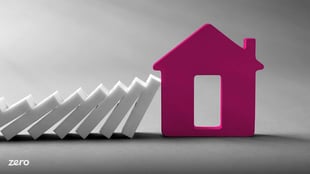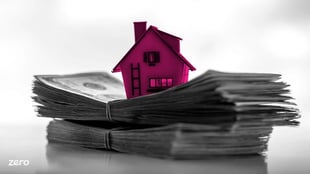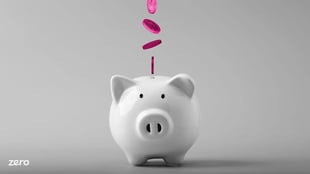Understanding Home Appreciation: Home Appreciation Calculator

People buy their homes for a number of reasons. Affordability, stability, and comfort are some of the most important factors. However, appreciation must also be considered when you’re thinking about buying, selling, or refinancing a home.
Understanding home appreciation is essential for homeowners. Knowing how home appreciation rates work and what they are in your neighborhood can help you to make the best choices for your financial security.
What Is Home Appreciation?
In real estate, appreciation refers to the increase in value of a piece of property over time. An increase in appreciation for a home can stem from several factors. Some of these factors have nothing to do with the home itself, but instead, they relate to the area around the home.
For example, increased job opportunities and growth in an area can help to increase average home appreciation in an area. When a new factory is opened nearby, there may be increased demand for homes in the area so that workers can enjoy a quick commute. This increased demand can lead to higher sale prices for the neighborhood, even if the homeowners haven’t changed anything about the homes that they’re selling.
However, homeowners can also affect their home’s appreciation. The best way of doing this is by investing in your home and making improvements.
What Are Average Home Appreciation Rates?
Average home appreciation rates are the rates at which homes increase in value for a given period of time. These rates will vary over time, but typically, they do not shoot up drastically. The rate of appreciation depends largely on location.
This is because the land on which your home sits is the one thing that cannot be changed about your home. When there is increased demand for homes in your local area, average home appreciation rates go up.
There is one factor in particular that can affect appreciation rates in locations across the United States: the economy. In a strong economy with greater spending, house prices tend to go up. However, the state of the economy is not the only influencer. Inflation can have the ability to increase and decrease the value of homes, as well.
Because inflation can affect the loans that potential home buyers may qualify for, they can also change the size of the pool of potential buyers, which can affect the balance of supply and demand in the market.
What Is the Average Appreciation Rate for Homes?
In the United States, the average appreciation rate for a home is between 3 - 5%. In the last 25 years, the average appreciation rate for a home in the United States was 3.9%.
There is a limited supply of land in any given area. The land that your home sits on becomes more valuable over time, as there are fewer building sites available. This is especially true when the land around you has been developed into restaurants, retail spaces, suburban tracts, and more. In areas that become more desirable over time, average home appreciation goes up.
How Do Home Appreciation Rates Affect You?
Home appreciation rates inform homeowners about what they can expect to sell their homes for at any given time. Higher appreciation rates mean that a homeowner can expect to sell their home for more than what they bought it for. Lower appreciation rates lead to properties that decrease in value.
A positive appreciation rate is something all homeowners should strive for. When you’re able to sell your home for more than its original purchase price, it can make it possible for you to upgrade to a larger home, pad your savings account, or help you to pay off debts with the excess.
How Do You Calculate Property Appreciation?
Appreciation is best understood as a percentage.
- To calculate property appreciation, you must divide the change in value by the initial cost of the property and multiply that by 100.
- For example, if your home was worth $200,000 when it was first purchased and is currently valued at $250,000, it would have an appreciation rate of 25%.
- The change in value is $50,000.
- $50,000 divided by $200,000 is 0.25.
- 0.25 multiplied by 100 is 25.
- Therefore, the home’s value increased by 25%.
If you would rather avoid calculations, the U.S. Federal Housing Finance Agency has a House Price Calculator that can assist you in determining your home appreciation value.
Ways to Keep Home Appreciation Value High
Because you can’t control the local market around you, for homeowners, the only way to keep home appreciation rates high is to maintain your home and keep it up to date.
To enjoy a high appreciation value, homeowners can do projects such as these:
Fix Up the Exterior of the Home
Maintaining your home’s exterior keeps it looking fresh and clean. It may seem simple, but even just a fresh coat of paint can help to enhance your curb appeal and protect your investment.
Redo the Home’s Interior
When they’re looking for a home, buyers usually want something that is updated to modern standards. Keeping the interior of your home clean, operational, and up-to-date can add thousands of dollars in value when it’s time to sell.
Make the Home More Energy Efficient
Energy efficiency is another valuable factor home buyers look for. Increasing your home’s efficiency can lower your gas and electric bills. Homebuyers are often willing to pay more for energy-efficient homes, as they understand that they’ll pay less in monthly utilities with an upgraded home.
Update the Home’s Technology
Smart homes make life easier, which has made them popular among buyers. Adding more advanced technology like newer thermostats and security systems can add value to your home.
Increase Square Footage
Square footage is one of the biggest selling points for a home. Adding square footage is not the easiest way to add value to a home, but adding structures like a deck or a guest house will almost always add thousands of dollars in value to your home.
You cannot always control what goes on around your home, but keeping your home up-to-date, looking good, and functioning properly will add value and increase appreciation.
Our Mortgage Learning Center features blogs on a wide range of mortgage and refinancing topics.
Where to Go From Here
So what is home appreciation? It’s the increased property value of your home over time. Because the trend for homes in the United States is currently about 3-5% in appreciation, this means that most homeowners will see their home’s value increase in the long run. However, to maximize home appreciation, homeowners need to do their part.
For more information about home appreciation for your specific property, contact one of our agents today! We can help you to understand the current value of your home and the ways that you can increase that value.
Find out About Refinancing Today!
This page last updated: October 28, 2022
Read more on this topic below.

When you buy a house and start making mortgage payments, your payment consists of four different components, known...

The vast majority of mortgage loans require you to put down a certain percentage of the selling price upfront....

Whether you’re a first-time buyer or you’ve purchased a home before, you’ve likely heard of a homeowner’s association....

Mortgage brokers play an integral and active role in the mortgage market, offering customers a service not made...

There’s a lot of expenses to keep in mind when you’re thinking about buying a home. Between the price of the home, property taxes, your mortgage...

Conventional loans are mortgages offered by private lenders, banks, and institutions that are not backed by the government. Unlike FHA, USDA,...

Some homebuyers refuse to purchase a property if it is part of a property owner association. On the...

Research indicates that 58% of homeowners in HOA communities and single-family homes pay an average monthly fee...

Private mortgage insurance is something millions of homeowners pay for each year. However, this type of insurance does not protect

When you first set out to buy a home, it can feel like you’re taking an exam you forgot to study for. You have to make quick...

When looking to refinance or buy a house, the pre-qualified vs pre-approved mortgage debate can be...

A mortgage is often the largest monthly expense homeowners pay. The thought of reducing the amount...

A home doesn’t just fall into foreclosure status. There are stages and processes that take place behind the scenes before...

It’s likely that your mortgage loan will be the largest loan you have during your lifetime. Mortgages are not a one size...

Refinancing your home can save you thousands of dollars per year! When you extrapolate that savings over...

For many people, owning a home is part of the American dream. To make this dream a reality, most people will take out a...

Whenever you’re looking to buy a house, you’ll quickly realize there are a lot of fees associated with obtaining a mortgage....

A bridge loan is a short-term loan a borrower may use while a more long-term financing contract is finalized. Bridge...

A loan estimate is crucial to obtain when looking for a loan. This estimate not only gives you the details of a mortgage but also compares offers...

If you’re looking to buy a house, and do not have a mountain of cash saved up, you’ll need to consider getting a mortgage to help you finance this...

If you find a property that you’re highly interested in buying but are concerned that the seller might choose...

Buying a home? You’ll likely need to get it appraised before you receive the clear to close. If you’re wondering...

If you’re an active service member, a veteran, or the surviving spouse of a veteran, and you want to ...

Innovative and cost-effective home improvement ideas are all over the internet, especially when it comes to...
